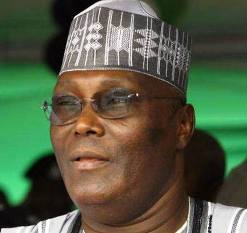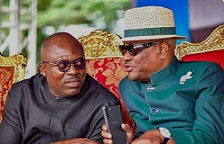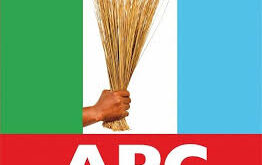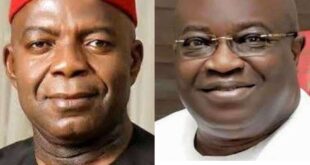By Ehichioya Ezomon
This is a response to a comment on my October 30, 2023, piece on, “How Supreme Court trashed Atiku’s ‘fresh evidence’ from Chicago.” Former Vice President Atiku Abubakar of Peoples Democratic Party (PDP) got the new evidence from President Bola Tinubu’s academic records and deposition to authenticate his certificate by the Chicago State University, in Illinois, United States, on October 2 and 3, respectively.
The respondent to the article on ‘NTA Benin Family Forum’ WhatsApp page, reposted a fabled, “Justice in 21st century Nigeria,” woven by Usman Muhammad around a murder case, in which the suspect was found guilty by the High Court and Appeal Court. But on his appeal to the Supreme Court, a CCTV footage showed the suspect didn’t commit the crime.
Yet, the Supreme Court justices said, “Since your lawyers didn’t tender the footage at the lower court within 21 days of your arrest, you will be hanged as earlier ruled.”
The poser: Why should the Supreme Court refuse the fresh evidence of fact that could’ve exonerated the suspect?
Corollarily, why should the Supreme Court refuse Atiku’s “new evidence” to prove that Tinubu presented a “forged certificate” to the Independent National Electoral Commission (INEC) for clearance for the February 25, 2023, poll?
Reproduced below are excerpts from my response, “Very wrong and off-the-point analogy,” to the respondent’s query:
“Elections are of a different kind (sui generis) from conventional legal matters. That’s why the rules and proceedures are different, too.
“The rules guiding the 2023 General Election, as per the amended Electoral Act 2022, mandate litigants to front-load their pleadings, and witnesses to be called.
“Once the actual proceedings start, you can’t plead what you didn’t front-load, because the other party to the dispute will no longer have a chance to reply. You can’t catch your opponent from behind.
“That’s what Atiku wanted to do with the CSU academic records of President Tinubu, and CSU’s deposition therefrom regarding the authenticity of his certificate.
“Besides, Atiku breached the Supreme Court Rules 1985 (as amended), whose Order 2, Rule 12 set three conditions for admitting new, fresh or additional evidence at the appeal stage. They’re:
“(1) The new evidence shouldn’t have existed or existed but couldn’t be deligently obtained before the appeal. Did Tinubu’s certificate saga just happen yesterday? No! It’s been on since 2003, when he ran for reelection as Governor of Lagos State.
“Remember the People’s Lawyer, Gani Fawehinmi (SAM), (SAN), fought the matter with all his legal prowess, and was unable to get judgment to nail Tinubu!
“(2) The new evidence shouldn’t be such that will affect the entire appeal. That’s, the evidence must not torpedo the appeal, which primarily emanated from the February 25 presidential poll.
“But Atiku (and Peter Obi, former Anambra State governor of Labour Party (LP)) virtually abandoned the allegations of electoral heist by Tinubu and All Progressives Congress (APC), in collabo with INEC. Rather, he focused on disqualifying Tinubu, as he knew he didn’t win the election, and the only remedy left was to rely on Technicalities, to remove Tinubu from office.
“(3) The evidence should be credible and believable, and needn’t be incontrovertible.
“Atiku held up the evidence as credible and believable, relying on the CSU deposition, which, though ordered by the court, as per Justice Maldonado, was done in Atiku’s lawyer’s chamber, where no court official was present to administer oath on the CSU Registrar, Caleb Westberg. It’s Atiku’s lawyer’s typist that reportedly administered the oath.
“Tinubu controverted Atiku’s allegation that CSU denied the certificate he submitted to INEC. CSU had sworn to affidavits, and issued statements, confirming Tinubu’s studentship and graduation from CSU.
“Atiku also fouled the rules when he initiated his case against CSU… He went to court in U.S. because it’d dawned on him he’s going to lose the case at the PEPC. That’s taking undue advantage of a situation, which’s against natural justice.
“So, you (respondent) wanted the Supreme Court to ignore these facts, including Atiku breaching the rules of court, both at the PEPC and Supreme Court, and give him judgment based on emotions, sentiments and morality?
“This is similar to what Obi said on November 6, 2023, at a press conference: that the Supreme Court ignored Public Opinion, and affirmed Tinubu’s victory!
“How did they expect 5 Justices of the Appeal Court, and 7 Justices of the Supreme Court to abandon the law for public opinion? Public opinion is the rule of the jungle, and not of human society!
“The maxim is, “The Law is the Law.” You’re not supposed to twist the law to favour one party, and disfavour the other party to a dispute.”
Were public opinion – a mob mentality that runs on emotions – the main determinant for choosing the President, there won’t be need for elections. Simply apply the rule of the thumb, and pick the candidate that’s more voices of support on social media.
This was evident at the February poll when Obi’s supporters in the OBIDIENTS Movement, who dominated social media, took that psyche to the election, believing that “the vote is in the bag” for Obi, who led in several opinion polls.
They refused to accept that elections aren’t won on opinion poll numbers, but on actual votes cast at the polling units, where Obi/LP was short of over 40,000 polling agents to guard his interest.
Many that paraded the social media were mere members of the general electorate; they’re no voters in the sense that they’d no Permanent Voter Cards (PVCs) that admit into the polling units, to be accredited to vote for their candidate.
Sitting in their comfort zones on Election Day, they relied on doctored information to guide them through the electoral labyrinth many were witnessing or paying attention to for the first time.
It’s no surprise that they bandied outrageous figures – that Obi won the election by moonslide – with one report claiming that Obi scored 50m votes, Atiku 25m votes, and Tinubu 15m votes, totalling 90m votes.
An unbelievable figure that outstrips the INEC reported PVCs collected by potential voters – also overblown, as it contained millions of PVCs that belonged to dead voters!
Still, Obi relied on such allied figures – plus the report that he won in 30 States, including in the 19 Northern States – to claim he won the election, but that INEC, Tinubu and the APC denied him victory.
And like Atiku, Obi didn’t submit evidence with probative value – not even an alternative result to counter alleged INEC-awarded figure to Tinubu – to support his claim. In court, Obi challenged the process, and not the outcome of the poll he boasted he won handily.
Atiku was expected to prove in the courts – with concrete and verifiable evidence – that he won the poll. But he didn’t stay the course, to establish allegations of massive fraud and violence, and INEC’s connivance with Tinubu and APC to deny him victory.
Rather, he concentrated on obviously pre-election matters to have Tinubu disqualified, so he could be declared the President (as he placed second in the February 25 presidential poll), have a re-run with Tinubu or a fresh election that exclude Tinubu.
Thus, the Atiku fresh evidence from Chicago wasn’t that of a factual report capable of turning the tables in his favour – such as the CCTV footage cited in the fabled murder case that could’ve saved an innocent suspect from the hangman’s noose – as it’s procured with deliberate disregard to the rules that govern election matters.
Lawyers know that strict observance of or adherence to the law, and rules and procedures of the court is sacrosanct. You ignore them at your own legal peril! And in election matters, the law, and rules and procedures can’t be sacrificed on the alter of admitting a belated remedial evidence.
Plaintiffs and respondents front-load their pleadings, and witnesses to be called at the exchange of briefs and replies by parties during pre-hearings, as no new, fresh or additional and better evidence – no matter how compelling – are allowed by the courts thereafter.
Lawyers are apprised with these processes before filing clients’ briefs, and during pre-hearings, and are, ipso facto, obligated to obey them throughout the proceedings from the lower to higher courts.
Did Atiku obey these processes – akin to a code of conduct – that his team of senior lawyers were abreast with? No! Actually, Atiku’s lead lawyer, Chief Chris Uche (SAN), admitted at the Supreme Court that he (Atiku) didn’t plead the new evidence he strove to impose on the court.
Mr Uche also agreed that the time for fresh evidence had lapsed, but he would rather the court give substantial justice – a euphemism for abandoning the law for emotion – based on the new evidence from Atiku’s discovery in Chicago.
You can’t break the law and also ask the law (court) to protect your right because you’ve a compelling reason for breaking the law. That’s what Atiku did!
He purposely ignored the rules of engagement, went to CSU without the court’s authorisation, obtained the new evidence he didn’t plead, and emotionally asked the court to accept it, “to prevent Bola Tinubu from embarrassing and damaging Nigeria and Nigerians’ image in the global community,” as he said at a World Press Conference in Abuja in October, following his discovery from Chicago.
No self-respecting court would accommodate such an entreaty from an appellant that affrontly breached the law, and the rules and procedures that guide election matters.
Hence Atiku’s appeal, like that of Obi, merited dismissal, and the Supreme Court accordingly threw it into the dustbin of history!
* Mr Ezomon, journalist and media consultant, writes from Lagos, Nigeria.
 PH Mundial – Port Harcourt Online Newspaper News Across The Region
PH Mundial – Port Harcourt Online Newspaper News Across The Region





